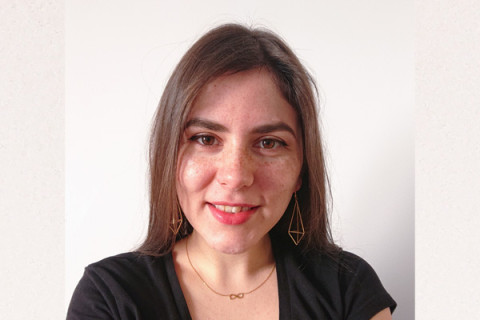Raluca Loredana Vasile defends her PhD: "Now I am no longer afraid to tackle a new project"

Raluca Loredana Vasile, former phD researcher under the supervision of Felipe Gándara, is now defending her thesis. The event will take place on March, 14th at the Facultad de Químicas (Complutense University of Madrid). Her work is entitled as 'Complex Metal-Organic Frameworks With Metal Sequences For Heterogeneous Catalysis', and is focused on MOFs.
Why did you choose ICMM for your PhD?
Before starting my PhD I had already worked with MOFs, specifically making batteries, and I fell in love with this type of materials, so I considered that the group in which I ended up doing my thesis was a perfect opportunity for me to continue exploring the world of MOFs and also to learn about Crystallography in a highly prestigious institute.
How would you explain your research to a non-scientific audience?
My research work has been focused particularly on multi-metal MOFs. During my PhD I was able to study and understand fundamental aspects of synthetic processes and the chemistry of the metal centers in order to overcome some of their main challenges. The results of this research are considered beneficial for the field of Reticular Chemistry since, in addition to achieving atomic control over the distribution of metals within the structure and also controlling the resulting composition of the sample, new elements have been explored as metal centers for these MOFs which will help broaden their range of reactivity and chemical versatility.
What are the main applications of your research? Could you give us an example?
MOFs are multifunctional materials and therefore have a wide range of applications. My work helps generate MOFs with combinations of metals and specific compositions tailored to a target application. During my PhD I synthesized MOFs and MOF-derived materials that were used as catalysts in an array of reactions relevant in the industry field (synthesis of organic reagents or compounds relevant to the pharmaceutical industry).
What are the lessons you have learned here? which one do you value the most?
I have learned that a PhD is not a simple uphill linear path, but a complex roller coaster, with twists and turns, and breathtaking highs and lows. During these years I have faced many new situations that have helped me grow both professionally and personally.
How do you think this experience will contribute to your training and to your future?
Lhe training you receive during a PhD is completely different from that of a bachelor's or master's degree. As I mentioned before, a PhD is a process of professional and personal growth. Now I am no longer afraid to tackle a new project, carry out new experiments that I have never tried doing before, or face a new laboratory and working environment. I feel much more prepared and I think I am able to manage new projects and approach them in a much more effective way, which will be very useful in my career.
What are your plans once you finish your PhD?
Once I finish my PhD I would like to continue working in the field of MOFs.
Why did you become a scientist? Who have been your role models?
Since I was a child I have always been fascinated by Science, especially by Chemistry since it was the "strangest" field and the one that people find difficult to understand; but I definitely knew I wanted to wear a lab coat and play around in the lab to find out why things happen. It is true that my driving force has always been Chemistry itself, but regarding role models, I think I never had a specific person in mind, I just looked up to all the female figures in Science because I wanted to become one of them.
Instituto de Ciencia de Materiales de Madrid (ICMM)
Sor Juana Ines de la Cruz, 3
Cantoblanco, 28049
Madrid, España
Telephone: (+34) 91 334 90 00
Email: @email
Communication Office: @email

Acknowledge the Severo Ochoa Centres of Excellence program through Grant CEX2024-001445-S/ financiado por MICIU/AEI / 10.13039/501100011033

Contacto | Accesibilidad | Aviso legal | Política de Cookies | Protección de datos
